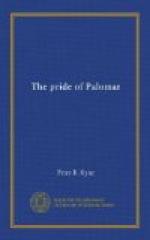“Farrel, you quite overwhelm me. A thousand thanks! I’ll treasure Panchito for your sake as well as his own.”
The soldier extended his hand, and the captain grasped it.
“Good-by, Sergeant. Pleasant green fields!”
“Good-by, sir. Dry camps and quick promotion.”
The descendant of a conquistador picked up his straw suitcase, his helmet, and gas-mask. At the door, he stood to attention, and saluted. The captain leaped to his feet and returned this salutation of warriors; the door opened and closed, and the officer stood staring at the space so lately occupied by the man who, for eighteen months, had been his right hand.
“Strange man!” he muttered. “I didn’t know they bred his kind any more. Why, he’s a feudal baron!”
III
There were three people in the observation-car when Michael Joseph Farrel boarded it a few minutes before eight o’clock the following morning. Of the three, one was a girl, and, as Farrel entered, carrying the souvenirs of his service—a helmet and gas-mask—she glanced at him with the interest which the average civilian manifests in any soldier obviously just released from service and homeward bound. Farrel’s glance met hers for an instant with equal interest; then he turned to stow his impedimenta in the brass rack over his seat. He was granted an equally swift but more direct appraisal of her as he walked down the observation-car to the rear platform, where he selected a chair in a corner that offered him sanctuary from the cold, fog-laden breeze, lighted a cigar, and surrendered himself to contemplating, in his mind’s eye, the joys of home-coming.
He had the platform to himself until after the train had passed Palo Alto, when others joined him. The first to emerge on the platform was a Japanese. Farrel favored him with a cool, contemptuous scrutiny, for he was a Californian and did not hold the members of this race in a tithe of the esteem he accorded other Orientals. This Japanese was rather shorter and thinner than the majority of his race. He wore large, round tortoise-shell spectacles, and clothes that proclaimed the attention of the very best tailors; a gold-band ring, set with one blue-white diamond and two exquisite sapphires, adorned the pudgy finger of his right hand. Farrel judged that his gray beaver hat must have cost at least fifty dollars.
“We ought to have Jim Crow cars for these cock-sure sons of Nippon,” the ex-soldier growled to himself. “We’ll come to it yet if something isn’t done about them. They breed so fast they’ll have us crowded into back seats in another decade.”




